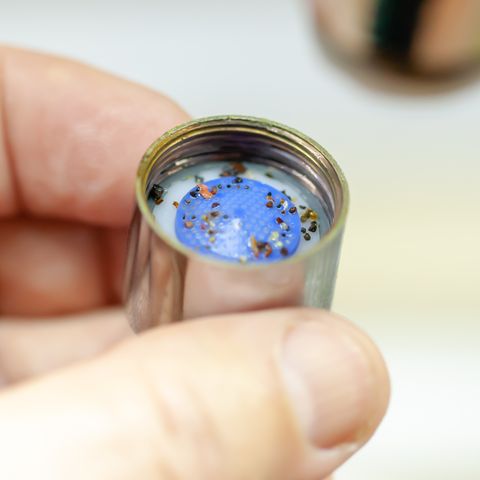Bathroom Sink Aerator
You already know how important it is to squash secret sources of kitchen filth — from your grimy coffee maker to your mold-harboring travel tumblers — before they get really bad. But there's one gunky hidden spot you might be missing: your kitchen faucet aerators.
In a Reddit thread asking users for the best cleaning tips they'd ever received, user SJ_Barbarian alerted homeowners to this sneaky source of gunk, writing:
CLEAN YOUR AERATORS! The end piece of many faucets twists right off, and for those that don't, you can buy a 'key' for less than two bucks at a home improvement store ... The little mesh parts can build up bacteria, mold, and plain old hard water deposits. Part of my job involves testing water for potability, and in order to get an accurate test of the line, we have to remove the aerators. Because they're gross.
Yikes. If you're tempted to run and check all of your home's aerators right now, we feel you. Before you do, however, here's what you need to know:
What is a faucet aerator?

Aerator Key and Removal Tool
First things first: Faucet aerators are the small pieces attached to the end of your kitchen, bathroom, and other sink spouts. They usually look like tiny mesh screens, and as Reddit user SJ_Barbarian noted, they often screw on and off.
Faucet aerators are small, but they actually serve a pretty significant purpose: They break up your faucets' water streams into a bunch of smaller streams, and by doing so, greatly reduce the amount of water that pours out your spouts — all without sacrificing the water pressure. Genius.
But why do faucet aerators get so dirty?
Well, because of the way aerators are designed, they end up acting as filters as well as water savers. This means faucet aerators catch a lot of the silt, minerals, and other debris that flow through your tap water. Over time, that debris builds up and can cause the flow from your faucet to decrease in strength.

Getty Images
How do I clean my faucet aerators?
The good news: Cleaning faucet aerators is surprisingly simple to do. Carolyn Forte, Director of the Home Appliances and Cleaning Products Labs at the Good Housekeeping Institute, recommends starting by unscrewing them and rinsing them clean with hot water. "Depending on how dirty they are, you may to scrub them with a little brush," she adds.
If you live in an area where the water is harder (meaning it has a higher concentration of calcium and magnesium), you might notice your faucet aerators are caked in minerals. In this instance, Forte recommends soaking them in white vinegar and giving them a good scrub.

At the end of the day, though, Forte says you shouldn't spend too much time stressing about keeping your faucet aerators clean — you've got too many other cleaning tasks to worry about to expend too much energy on this one.
"If the water starts trickling out, or you notice sediment in the water, I would check them," she advises. Until then, you should be fine just letting your aerator do its thing.
This content is imported from {embed-name}. You may be able to find the same content in another format, or you may be able to find more information, at their web site.
Heather Finn Content Strategy Editor Heather Finn is the content strategy editor at Good Housekeeping, where she heads up the brand's social media strategy and covers entertainment news on everything from ABC's 'The Good Doctor' to Netflix's latest true crime documentaries.
This content is created and maintained by a third party, and imported onto this page to help users provide their email addresses. You may be able to find more information about this and similar content at piano.io
Source: https://www.goodhousekeeping.com/home/cleaning/a28198674/how-to-clean-dirty-faucet-aerator/

0 komentar:
Posting Komentar